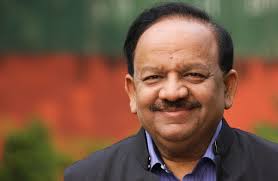
Union Minister for Science & Technology and Earth Sciences, Dr. Harsh Vardhan, inaugurated India’s 1stSecond–Generation (2G) Ethanol plant at Kashipur in Uttarakhand. Taking pride in the indigenously–developed technology and its evolution into a demonstration plant, he said that more such examples are needed, for the initiatives like Make in India and Swachh Bharat Abhiyan to be truly successful. Such technological breakthroughs can make India stand out as a leader in the world’s struggle to save the earth from challenges of global warming, he noted.
The Minister said that it is a novel technology suited to both Indian & Global Needs and is projected to be capable of converting all types of agricultural residues like Bagasse, Rice Straw, Wheat Straw, Bamboo, Cotton Stalk, Corn Stover, Wood chips etc. to ethanol in less than 24 hours, with optimum product yields. If successfully operated and scaled–up, it will establish India as a major global technology provider in the arena of renewables and reduction in carbon–emissions, besides effecting considerable savings in import of crude–oil.
The Technology Demonstration plant, with a capacity to consume 10 tons of biomass per day, is based on the globally–competitive indigenous technology of converting lingo–cellulosic biomass to Ethanol. It is a Feedstock–independent technology developed by DBT–ICT Centre for Energy Biosciences at the Institute of Chemical Technology (ICT) Mumbai, supported by Department of Biotechnology, Ministry of Science and Technology and the Biotechnology Industry Research Assistance Council (BIRAC).
Government of India has set a mandate of 5% blending of renewable biofuel in both petrol and diesel. While diesel biofuel blending is near zero, the petrol blending today stands at an overall of about 3% in the form of first generation (1G) or molasses–based Ethanol. While the annual requirement of 1G–ethanol stands at about 500 crore litres, the current total installed capacity is about 265 crore litres. In such a scenario, the targets of 10% blending by 2017 and 20% by 2020 look remote unless agricultural waste based ethanol i.e. 2G–Ehanol production technologies are successfully demonstrated. India’s potential for 2G–Ethanol production from a mere 10% of its non–food and non–fodder agricultural residues, currently estimated to be available in excess of 300 million tons, stands at nearly 1000 crore liters of ethanol.
Secretary, Department of Biotechnology, Dr. K. Vijay Raghavan, expressed confidence that this technology, with the lowest capital and operating costs, would allow 2G–Alcohol to be produced and sold at globally–competitive price. The DBT–ICT Centre has already developed designs of plants with capacities of 250 – 500 tons/day. He said that this is an example of how we can work on the challenges the world faces, define them in Indian labs and then strive to solve them for the benefit of the world community in general and India in particular.








Leave a Reply
You must be logged in to post a comment.